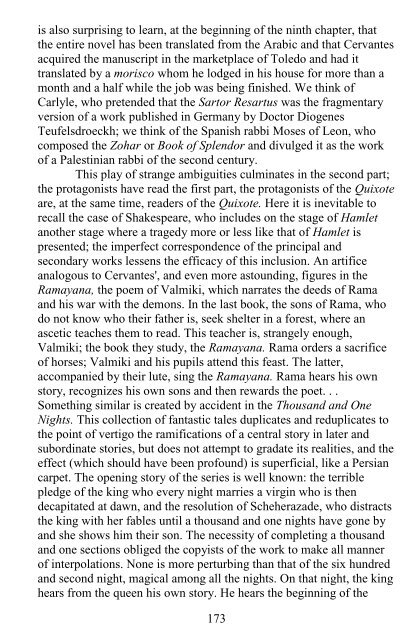Jorge Luis Borges - Labyrinths
Jorge Luis Borges - Labyrinths
Jorge Luis Borges - Labyrinths
Create successful ePaper yourself
Turn your PDF publications into a flip-book with our unique Google optimized e-Paper software.
is also surprising to learn, at the beginning of the ninth chapter, that<br />
the entire novel has been translated from the Arabic and that Cervantes<br />
acquired the manuscript in the marketplace of Toledo and had it<br />
translated by a morisco whom he lodged in his house for more than a<br />
month and a half while the job was being finished. We think of<br />
Carlyle, who pretended that the Sartor Resartus was the fragmentary<br />
version of a work published in Germany by Doctor Diogenes<br />
Teufelsdroeckh; we think of the Spanish rabbi Moses of Leon, who<br />
composed the Zohar or Book of Splendor and divulged it as the work<br />
of a Palestinian rabbi of the second century.<br />
This play of strange ambiguities culminates in the second part;<br />
the protagonists have read the first part, the protagonists of the Quixote<br />
are, at the same time, readers of the Quixote. Here it is inevitable to<br />
recall the case of Shakespeare, who includes on the stage of Hamlet<br />
another stage where a tragedy more or less like that of Hamlet is<br />
presented; the imperfect correspondence of the principal and<br />
secondary works lessens the efficacy of this inclusion. An artifice<br />
analogous to Cervantes', and even more astounding, figures in the<br />
Ramayana, the poem of Valmiki, which narrates the deeds of Rama<br />
and his war with the demons. In the last book, the sons of Rama, who<br />
do not know who their father is, seek shelter in a forest, where an<br />
ascetic teaches them to read. This teacher is, strangely enough,<br />
Valmiki; the book they study, the Ramayana. Rama orders a sacrifice<br />
of horses; Valmiki and his pupils attend this feast. The latter,<br />
accompanied by their lute, sing the Ramayana. Rama hears his own<br />
story, recognizes his own sons and then rewards the poet. . .<br />
Something similar is created by accident in the Thousand and One<br />
Nights. This collection of fantastic tales duplicates and reduplicates to<br />
the point of vertigo the ramifications of a central story in later and<br />
subordinate stories, but does not attempt to gradate its realities, and the<br />
effect (which should have been profound) is superficial, like a Persian<br />
carpet. The opening story of the series is well known: the terrible<br />
pledge of the king who every night marries a virgin who is then<br />
decapitated at dawn, and the resolution of Scheherazade, who distracts<br />
the king with her fables until a thousand and one nights have gone by<br />
and she shows him their son. The necessity of completing a thousand<br />
and one sections obliged the copyists of the work to make all manner<br />
of interpolations. None is more perturbing than that of the six hundred<br />
and second night, magical among all the nights. On that night, the king<br />
hears from the queen his own story. He hears the beginning of the<br />
173


